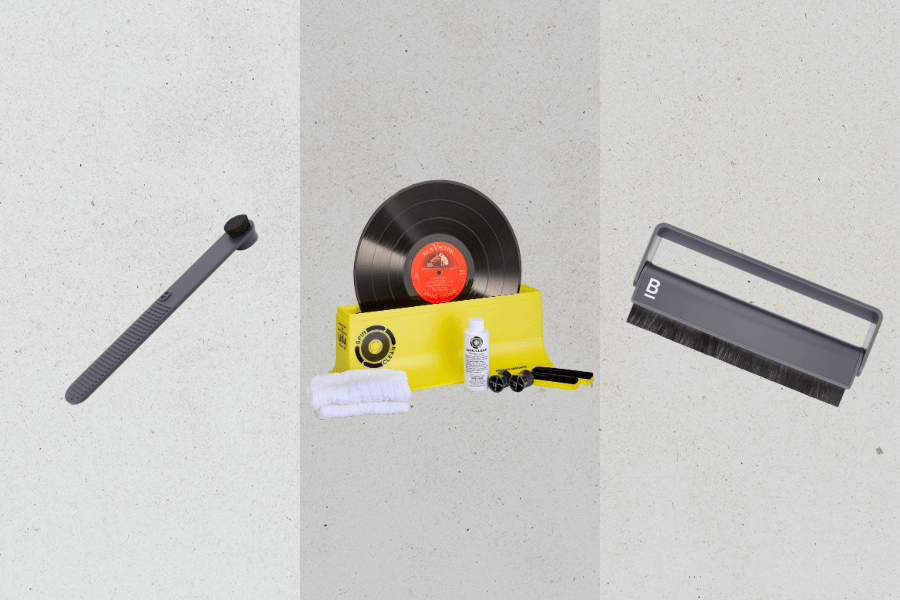If you purchase an independently reviewed product or service through a link on our website, Rolling Stone may receive an affiliate commission.
As fun as collecting records can be, vinyl is a finicky medium. Records can get warped and worn down, and they attract dust (so much dust). The best value for vinyl is often buying used, but between damp basements, improper handling, and Father Time, almost all used vinyl is going to need a little TLC to be in good playing order.
Even new records can be staticky, with a surprising amount of dust (even if they’re shrink-wrapped!). Having collected vinyl for well over a decade, I have done a fair amount of trial and error in cleaning and caring for records. But for expert insight, I spoke to Thomas Dechristofaro, who works in quality control in the audio department at Third Man Records, for tips and tricks on caring for records.
Here’s what you need to know about cleaning vinyl. If you’re looking for more hi-fi advice, we’ve got tips on the best bookshelf speakers, speaker stands, and buying vinyl online.
Before Every Play: Use a Static Brush
![]()
Jonathan Zavaleta/Rolling Stone
Boundless Audio Record Cleaner Brush
One of the easiest, most reliable ways to keep records sounding their best is to use a brush before each play. Carbon fiber is particularly useful, as it removes static, while the bristles help remove dust.
My favorite options feature two rows of bristles to lift dust off the record, plus a rotating plastic arm that knocks dust off the brush for the next use. I’ve used this brush from Boundless for years, but most of these types of brushes are essentially interchangeable.
It’s a good idea to do clean new records, too, as Dechristofaro explains: “I also like to give a light cleaning to new records to remove static electricity that sometimes hangs around after being pressed. This will smooth it out, discharge any static, and make them play better.”
For Used Records: Use a Record Washer
![]()
Jonathan Zavaleta/Rolling Stone
Spin-Clean Record Washer Kit
For used records or after many plays, it’s a good idea to give a deeper cleaning to vinyl. While it’s more expensive than spray solutions, I’ve found that the Spin-Clean Record Washer does a better job of cleaning albums than sprays, without leaving any residue.
The process is somewhat involved and requires making a solution of distilled water and the cleaning fluid (included with the kit). That’s why it’s best to set aside time to clean multiple records in one session (I typically do about 10-15). Spin-Clean also includes lint-free rags to dry the records, and I use a basic dish rack to let the records fully air out before putting them away.
When applying any kind of pressure to records, Dechristofaro noted, “it’s important to move with the grooves, and not against them.” For deep cleaning, Dechristofaro recommends the VPI Record cleaning machine. It’ll set you back over a grand, so it’s likely best for serious collectors. Still, he said it’s “worth every penny if you’re invested enough in records to want to have one.”
Between Plays: Proper Storage
![]()
Poly Lined Paper Protective LP Inner Sleeves
Proper storage can help extend the longevity of vinyl records. For starters, they should be stored vertically and never stacked to prevent warping, and the best way to handle records is by the edges. Like many things, vinyl does better in a cool, dry place.
Quality inner sleeves can help protect vinyl from scuffs and dust between plays. Used records will often have torn or dusty sleeves, so it can be a good idea to replace them. Dechristofaro suggests using poly-lined inner sleeves.
Even well-maintained records will pick up some dust, which is why collectors should also clean the stylus on their turntable. Dechristofaro suggests using a basic stylus brush, which can help remove gunk and dust from the stylus. I’ve also had success with the Onzow Zerodust cleaner, which gently removes dust from the stylus.
![]()
![]()
Onzow Zerodust Stylus Cleaner
How Often Should You Clean Records?
Dechristofaro suggests “a good cleaning when you first get a used record.” Otherwise, as obvious as it seems, simply clean your records when they’re dirty. “It really depends on how much you handle them. I DJ quite frequently, so those records get touched up quite a bit. Moral of the story, check on your old records occasionally, like they’re old friends you haven’t seen in a while.”
If you’re hearing excessive crackles and pops, or the album sounds fuzzy, it’s probably due for a proper cleaning. That said, there’s little that can be done about scratched records, so it’s a good idea to properly inspect any used records you’re thinking of buying.

